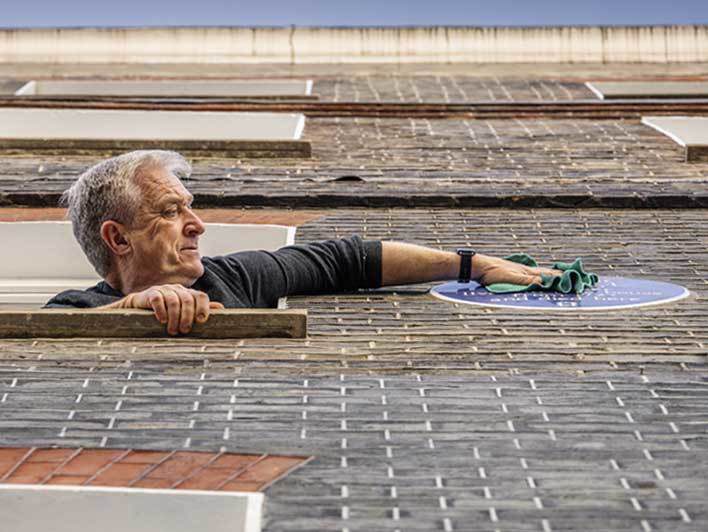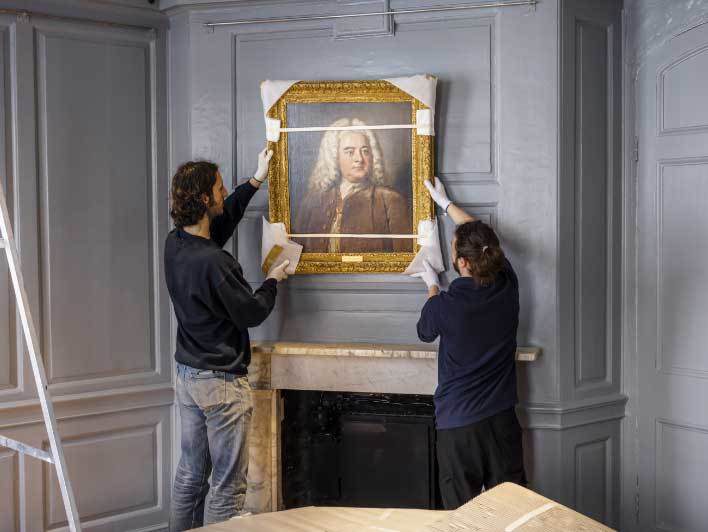ALCINA (HWV 34)
Libretto: Unknown, after Riccardo Broschi's L'Isola d'Alcina, 1728, from Ludovico Ariosto's, Orlando Furioso.
First performance: 16th April 1735, Covent Garden Theatre, London
Cast
- Anna Maria Strada del Pò (Soprano)
- Cecilia Young (Soprano)
- Giovanni Carestini, called "Cusanino" (Mezzosoprano-castrato)
- Maria Caterina Negri (Contralto)
- John Beard (Tenor)
- Gustavus Waltz (Bass)
- Mr. William Savage (Boy soprano)

Synopsis
The setting of the opera is the enchantress Alcina’s island: here by her magic powers she has created a magnificent palace in a beautiful landscape, to lure her many lovers into her power. One of these is Ruggiero, a warrior, who under Alcina’s spell has forsaken his duty and his betrothed, Bradamante.
Act I
The opera begins with the arrival of Bradamante (disguised as her own brother Ricciardo) and Melisso (her former tutor) on the sea shore. With the help of a magic ring they intend to break the spell which binds Ruggiero to Alcina, and to release her other captives, who have been variously transformed. Bradamante and Melisso are greeted by Alcina’s sister, Morgana (also an enchantress) and pretend to have lost their way. Morgana immediately falls in love with ‘Ricciardo’ (Bradamante), although she is betrothed to Oronte, the commander of Alcina’s forces.
The scene changes to Alcina’s palace, where she sits in splendour. She greets the strangers, and lavishly expands on her love for Ruggiero, asking him to show her guests her palace and estates. When she has gone, the boy Oberto asks Melisso and Bradamante to help him to find his father, Asotlfo; it is clear to them (though Oberto is ignorant of it) that he must have been changed into a wild beast, like so many others.
Melisso and Bradamante, finding themselves alone with Ruggiero, tax him with his desertion, but he treats them with contempt; he longs only for Alcina’s return, and leaves them.
Oronte, Morgana’s lover, has already discovered her new passion for ‘Ricciardo’, and now challenges ‘him’. Morgana hurries in to intercede, spurning Oronte, and defending ‘Ricciardo’. Later, Oronte meets Ruggiero still looking for Alcina; and in malevolent mood, decides to reveal to him Alcina’s treatment of her past lovers. When Ruggiero refuses to believe in her infidelity, Oronte invents a passion on Alcina’s part for ‘Ricciardo’ to convince him. On finding Alcina, Ruggiero confronts her wih this supposed love; she strongly denies it, and reaffirms her love for Ruggiero, in Bradamante’s presence. After Alcina’s departure, Bradamante cannot resist revealing her identity to Ruggiero, though Melisso quickly denies it. Ruggiero chooses to believe Melisso, and assuming ‘Ricciardo’ to be trying to conceal ‘his’ love for Alcina, boasts that her affections are his alone, and departs.
Morgana comes in with the news that Alcina intends to prove her love to Ruggiero by turning ‘Ricciardo’ into a wild beast; Morgana urges ‘him’ to escape, but ‘Ricciardo’ (Bradamante) tells her to go back to Alcina to say that ‘he’ cannot love her, as ‘he’ loves another; when Morgana assumes that this refers to her, Bradamante allows the deception, and withdraws. Morgana concludes the act with rejoicing in ‘Ricciardo’s’ love.

Act II
The second act brings the almost immediate revelation to Ruggiero that he is the victim of enchantment. After lamenting Alcina’s absence, Ruggiero is confronted by Melisso, now disguised as his old tutor, Atlante. Ruggiero is sternly reminded of his duty, and when Melisso/Atlante puts the magic ring on his finger, the island is revealed as it really is, empty of all grandeur and beauty. He immediately longs to see Bradamante, and repair the damage caused by Alcina. Melisso, now himself again, tells him of the plans for escape. Ruggiero is to put on his armour, and pretending to long to hunt in the forest, make his escape. Although he is now free of the enchantment, he still mistrusts Alcina; and at his next meeting with Bradamante he cannot be sure that Alcina has not disgusied herself as Bradamante to keep him in her power. Bradamante is in despair; Ruggiero, left alone, fears for the consequences if, after all, he has again failed Bradamante.
Morgana interrupts Alcina as she prepares to utter the spell which will turn Bradamante into a wild beast. She is followed by Ruggiero, who, without revealing that he no longer loves her, convinces Alcina that he desires nothing so brutal to convince him of her love. He then persuades her, against her will, to let him go hunting.
Oberto reappears, still lamenting his father’s disappearance; Alcina is moved, and offers him hope of reunion.
Oronte now brings news of the intentions of Ruggiero, Melisso and Bradamante to flee, and Alcina laments her fate. Although Oronte taunts Morgana with ‘Ricciardo’s’ defection, she refuses to believe him. Bradamante next appears, with Oberto, and swearing him to secrecy, tells him of her power to break Alcina’s spells, and thus release his father.
Bradamante and Ruggiero are now at last united; Morgana overhears them, and is outraged to find that ‘Ricciardo’ is Bradamante, and that Alcina has been betrayed by Ruggiero. The act concludes with Alcina’s vain attempts to summon her spirits to prevent Ruggiero’s flight, and she throws away her wand in despair.

Act III
The last act opens with Morgana’s efforts to regain the affections of Oronte. As he swore to do earlier, he rebuffs her; but when she has gone, he admits that he still loves her. Ruggiero and Alcina unexpectedly meet, and she demands to know why he is leaving her. When he tells her that he must return to his duty and his betrothed, she contemptuously dismisses him, swearing vengeance.
Melisso, Bradamante and Ruggiero prepare to rout Alcina’s forces with the magic ring and shield; Bradamante swears to leave the island only when all Alcina’s victims are released.
Oronte next informs Alcina that her navy has indeed been defeated at the hands of Ruggiero; aside, he expresses satisfaction that Alcina is at last going to pay dearly for her cruelty. Alcina, in despair, longs for oblivion. When Oberto reminds her of her promise to reunite him with his father, she maliciously brings a lion out of its cage, and orders Oberto to kill it with her dagger. He knows it must be his father and, refusing, threatens her instead, before retreating with the dagger.
The final stage begins with Ruggiero and Bradamante approaching an urn, source of all Alcina’s magic power, intending to destroy it. In an attempt to prevent them, Alcina forswears any evil intentions, claiming only desire for their happiness. She offers to break the urn herself; but she has lost all hope of being trusted, and Ruggiero duly shatters the enchanted urn. Alcina and Morgana rush away, lamenting their doom.
The end of Alcina’s magic powers causes the palace to be ruined and submerged by the sea. Alcina’s bewitched lovers are revived, Oberto and Astolfo are reunited, and all sing of their relief and joy.
(c) Harriet Mason, EMI Records Ltd.
Context
Alcina followed hard on the heels of Ariodante, and between them Handel had presented his oratorio season. The story of the enchantress Alcina, like Handel’s two previous operas Orlando
and Ariodante, was taken from Ariosto’s Orlando furioso. After the fabulous tale of Orlando’s madness, and the courtly spectacle of Ariodante, Handel once again turned to a story of magic and enchantment. The libretto closely follows that of Riccardo Broschi’s L’Isola d’Alcina which had appeared in Rome in 1728. It is perhaps significant that Handel chose a libretto written by the brother of the great castrato Farinelli, whose performances with the rival Opera of the Nobility were having such a damaging effect on Handel’s new company at the Theatre Royal in Covent Garden.
An interesting addition to the story is the subplot of the boy Oberto, which does not appear in Broschi’s original. The part was created specifically by Handel to showcase the talents of a new discovery, the young William Savage. The boy had been enormously successful as Joas in the performances of Athalia that preceded Alcina, and it seems that Handel wrote the part of Oberto at the last moment to capitalise on the boy’s popularity.
Alcina went some way to re-establishing Handel’s position with the fickle London public. The opera even survived the disgrace of Marie Sallé who was hissed off the stage during one performance for wearing a particularly provocative costume during one of the ballet sequences. Soon after, she returned to Paris in disgrace. The spectacle offered by the transformation scenes, so familiar now to Rich’s audiences, and Handel’s inventive and melodic music, kept the opera alive and it ran for 18 performances.
Mary Pendarves, Handel’s neighbour, records in her diary attending the first rehearsal of Alcina on 11th April 1735 in Handel’s house in Brook Street: ‘I think it is the best he ever made’, she reported ‘but I have thought so of so many, that I will not say positively ‘tis the finest, but ‘tis so fine I have not words to describe it…Whilst Mr. Handel was playing his part, I could not help thinking of him a necromancer in the midst of his own enchantments.’


